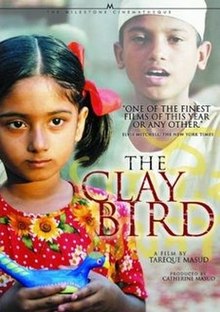| Matir Moina | |
|---|---|
 Film poster | |
| Bengali | মাটির ময়না |
| Directed by | Tareque Masud |
| Written by | Tareque Masud |
| Screenplay by |
|
| Story by | Tareque Masud |
| Produced by | Catherine Masud |
| Starring |
|
| Cinematography | Sudheer Palsane |
| Edited by | Catherine Masud |
| Music by | Moushumi Bhowmik |
Production companies |
|
| Distributed by |
|
Release dates |
|
Running time | 98 minutes |
| Country | Bangladesh |
| Language | Bengali |
| Budget | $300,000 |
| Box office | est. US$46,852 |
Matir Moina (Bengali: মাটির ময়না; also known in English as The Clay Bird) is a 2002 Bengali war-drama film written and directed by Tareque Masud. It was his debut feature film. Based on Tareque's story the screenplay was co-written by Tareque and Catherine Masud. In the film, Tareque's childhood experience is revealed against the backdrop of 1969 Mass uprising in East Pakistan on the eve of Bangladesh Liberation War. The film stars Nurul Islam Bablu, Russell Farazi, Jayanta Chattopadhyay, Rokeya Prachy, Soaeb Islam and Lameesa R. Reemjheem in the lead role. It is considered one of the best Bangladeshi films of 21st century.[1]
The film deals with its historical references during the independence of Bangladesh. It portrays the experiences of a young protagonist, his family, his teachers and his life at the madrasah. Production began with initial funding from the French government. The film was officially screened on 15 May 2002 at the 55th Cannes Film Festival. Produced by Catherine Masud, the film grossed about US$48,752 at the box office after its release.
The film was initially banned in Bangladesh. After the expulsion order was revoked, VCD and DVD version of the film were released on 17 April 2005 by Laser Vision. In 2002, as the first Bangladeshi film, it won the FIPRESCI Prize in section Directors' Fortnight at the Cannes Film Festival. In 2004, the film won the National Film Awards for Best Child Artist and Best Screenplay. The film also won various domestic and international awards, including awards in five categories at the 24th Bachsas Awards. It was Bangladesh's first submission for Best Foreign Language Film category at the 75th Academy Awards in 2002.[2]
- ^ "Matir Moina and 50 years of independence". New Age. Retrieved 25 June 2023.
- ^ Cite error: The named reference
Oscarwas invoked but never defined (see the help page).